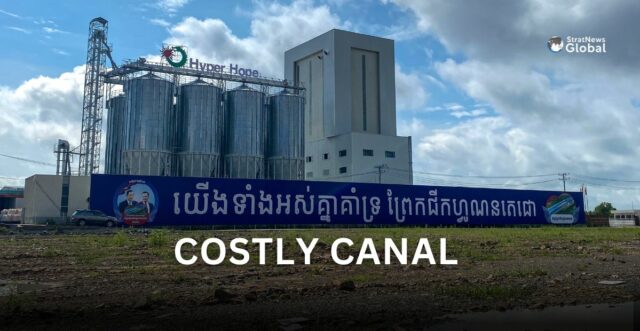Months after Cambodia’s leader Hun Manet announced the contribution of 49% funding from China for the Funan Techo Canal that will link the Mekong River to the Gulf of Thailand, China’s financial contribution remains in doubt.
Cambodia’s government estimates the strategic, if contentious, infrastructure project will cost $1.7 billion, nearly 4% of Cambodia’s annual gross domestic product.
But months later, China’s financial contribution remains in doubt.
Four people directly involved in the investment plans or briefed about them told Reuters Beijing has expressed misgivings about the project and has not made definitive commitments on its funding.
“It is normal business practice for Chinese companies to assist Cambodia in exploring the construction of comprehensive water conservancy projects in accordance with market principles,” China’s foreign ministry said in an emailed statement to Reuters when asked about the canal.
The Chinese ministry did not answer a direct question about the funding but said the two countries were “ironclad friends,” a comment echoed by Hun Manet in late October.
China’s lack of clear commitment could jeopardise the entire plan, given uncertainty over the project’s costs, its environmental impact and financial viability.
It also underscores how Beijing is drastically downsizing its overseas investments as its domestic economic struggles, even in countries it considers strategic partners.
Once a prime example for Western-backed “nation-building” after the long civil war that followed the fall of the Khmer Rouge regime, Cambodia has in recent times been widely seen by diplomats and foreign policy experts as a Chinese client state, owing to Beijing holding more than one-third of its total state debt.
But Chinese investment in the Southeast Asian nation is now plunging, after a series of unsuccessful infrastructure projects, amid concerns over criminal gangs targeting Chinese nationals, and dropping tourist numbers.
Differing Narratives
The 180km canal would greatly expand an existing waterway and divert water from the fragile rice-growing Mekong Delta to the Gulf of Thailand, cutting Cambodian shipping through Vietnamese ports.
In the months after the Cambodian government signed an “investment framework agreement” in October 2023 with China Road and Bridge Corporation (CRBC), a state-owned construction company, Cambodian officials went public about China’s financial involvement.
In October, a CRBC official told Reuters that the ownership figures were not final, calling the situation “very complicated.”
One person directly involved in the investment plans told Reuters in early November there was no Chinese money on the table at that stage, confirming the account from another official.
More than three months after groundbreaking, the site of the ceremony on the bank of the Mekong lies abandoned, notes a Reuters reporter.
Chinese funding for overseas projects is also falling elsewhere, but in Cambodia the impact “could be very pronounced,” said Grace Stanhope of the Lowy Institute, a Sydney-based think tank.
China is still building roads and other infrastructure but has pulled out from the construction of the new Phnom Penh airport, where it had initially committed $1.1 billion.
Another recently completed Chinese-backed airport at Siem Reap to serve the UNESCO world heritage site of Angkor Wat “is very quiet,” said Ou Virak, head of Cambodian think tank Future Forum, noting investors may face losses.
Chinese private investment remains high, but multiple Phnom Penh-based diplomats and financial experts point to once large inflows of Chinese informal funds destined to the gambling industry and real estate sector having dried up.
Chinese tourism, once a major source of income for Cambodia, has also struggled to recover from the COVID pandemic.
That has coincided with a prolonged Chinese campaign warning tourists of risks linked to an online scams industry in Cambodia.
(With inputs from Reuters)





